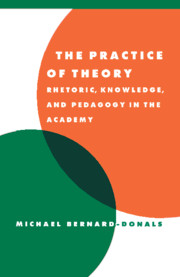Book contents
- Frontmatter
- Contents
- Acknowledgments
- Introduction
- 1 Reconsidering Gorgias, Phaedrus, and Platonic rhetoric
- 2 Why Aristotle's notion of rhetoric and science is important for contemporary critical practice
- 3 A (rhetorical) reading of the human sciences: toward antifoundationalism
- 4 Rorty and the mirror of nature: hermeneutics and the possibility of social change
- 5 Louise Phelps and Theory: toward a human science disciplined by practical wisdom
- 6 Liberatory pedagogy, conceptual knowledge: toward a practical wisdom disciplined by scientific observation
- 7 Toward a materialist rhetoric: writing the conditions of the incommensurable
- Works cited
- Index
5 - Louise Phelps and Theory: toward a human science disciplined by practical wisdom
Published online by Cambridge University Press: 04 August 2010
- Frontmatter
- Contents
- Acknowledgments
- Introduction
- 1 Reconsidering Gorgias, Phaedrus, and Platonic rhetoric
- 2 Why Aristotle's notion of rhetoric and science is important for contemporary critical practice
- 3 A (rhetorical) reading of the human sciences: toward antifoundationalism
- 4 Rorty and the mirror of nature: hermeneutics and the possibility of social change
- 5 Louise Phelps and Theory: toward a human science disciplined by practical wisdom
- 6 Liberatory pedagogy, conceptual knowledge: toward a practical wisdom disciplined by scientific observation
- 7 Toward a materialist rhetoric: writing the conditions of the incommensurable
- Works cited
- Index
Summary
Near the beginning of Composition as a Human Science, Louise Phelps notes that “the framework on which the positive directions of postmodern culture converge is an essentially rhetorical one, and as such both fits the needs of composition for a global philosophy of knowledge in relation to praxis and also opens the way for composition to help articulate and realize this paradigm” (6). The book goes on to trace the rise of the “postmodern consciousness,” characterized by its rejection of positivism and its uncritical acceptance of science as both objective and progressive, and by the adoption of acutely self-reflexive modes of thought that situate both the object of inquiry and the methodology for inquiry in sites of contestation. Because the postmodern situation understands the world as mediated primarily by means of language, then it is natural to assume that any discipline that understands itself as primarily interested in the complexities of language and writing should be at the center of contemporary epistemological debates: what can be known, and what is the nature of that knowledge? Phelps suggests that it is composition which recognizes itself as central to these debates, but that the field is currently in something like a crisis of confidence. This crisis begins with compositionists' questions about the nature of their “field,” and its connection to other fields of knowledge, not just in the human but also in the natural sciences.
- Type
- Chapter
- Information
- The Practice of TheoryRhetoric, Knowledge, and Pedagogy in the Academy, pp. 130 - 160Publisher: Cambridge University PressPrint publication year: 1998

